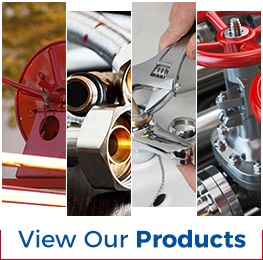
Many industrial processes utilize the properties of negative and positive pressure to perform a wide range of tasks. Hydraulic systems and pneumatic systems use positive pressure to operate tools and machinery, as well as to transport and lift objects.
All these processes depend on maintaining a stable, acceptable level of pressure inside the system. Too little pressure and performance can be affected. Too much pressure can cause damage to the components within the system. Failure can result in fires, explosions, and other serious accidents that can destroy property and injure or even kill workers.
The Role of Pressure Gauges
In order for these processes to work safely and efficiently, there needs to be some way to monitor the pressure within a system. Pressure gauges are instruments used to measure and monitor pressure within a system. Pressure levels can be precisely adjusted to ensure safe and efficient operation based on the information provided by a gauge.
There are many different types of pressure gauges. Which one is used depends upon the application. Some of the more common types of pressure gauges include dry gauges, liquid gauges, and vacuum gauges.
Oil and gas, manufacturing, electronics, HVAC, pharmaceuticals, food processing, chemical processing, aerospace, automotive, and medical are just some of the industries that use pressure gauges for various applications.
How Do Pressure Gauges Work?
At its most basic, a gauge consists of a component such as a Bourdon tube to record and measure changes in pressure, a connection port, and an analog or digital display all enclosed by protective casing. A window protects the display from being damaged.
Traditionally, gauges measure pressure using a coiled, flexible metal tube called a Bourdon tube. The Bourdon tube reacts to changes in pressure within a system, expanding or contracting based on the pressure differential between the system and the reference pressure. It’s connected to a gear and shaft assembly that work together to move a pointer. Today, some gauges use digital sensors to measure pressure rather than Bourdon tubes.
Pressure gauges can be back or bottom mounted. Pressure gauges are made out of plastic, stainless steel, brass, and other materials. Gauges can be constructed to withstand pressures up to 10,000 PSI as well as high temperatures and corrosion. Regular maintenance is essential for the accurate operation of a pressure gauge. Gauges need to be calibrated on a regular basis to ensure the accuracy of their readings.
North America’s Leading Supplier of Pressure Gauges
Without quality gauges, detailed oversight and control of fluid and gas processes is all but impossible. ASJ Industrial Hose and Fittings is your source for the most reliable and durable pressure gauges on the market. We have just the right pressure gauge for your applications, whether you are working with air, water, chemicals, concrete, hydraulics, pneumatics, or some other material. ASJ Industrial Hose and Fittings is a family-owned business that’s been providing top-quality pressure gauges, hoses, clamps, fittings, valves, and firefighting supplies to companies across North America since 1982. Our knowledgeable staff is here to help you find the right products for your specific needs. You can contact ASJ Industrial Hose and Fittings through our website or call us at (951) 735-1351 to learn more about our products and get a quote.



 Phone:
Phone: